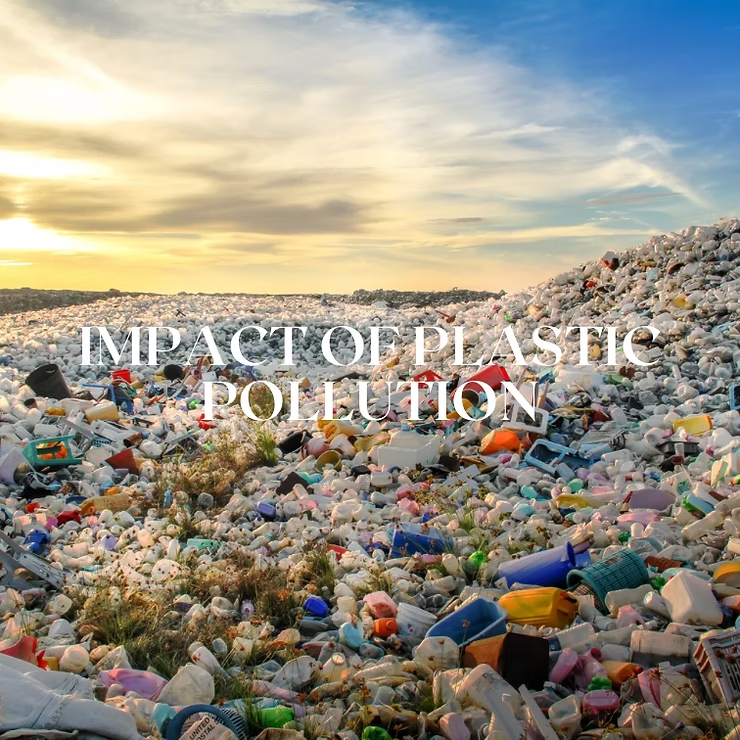Overview
Plastic pollution is the accumulation of plastic waste in the environment, especially in the ocean. This issue arises from the excessive use and improper disposal of plastics such as bags, bottles, and straws. Since plastics are not easily biodegradable, they can persist for centuries, causing severe damage to ecosystems, marine life, and human health. As a global problem, it requires urgent collective action.
Why Plastic Pollution is Harmful
Plastic pollution is one of the greatest threats to ocean health. Marine animals often become entangled in plastic or mistake it for food, which can lead to injury or death. When plastic breaks down into microplastics, it contaminates the water and enters the food chain, eventually reaching humans through seafood consumption. The consequences include damaged ecosystems and increased health risks, making it clear that reducing plastic use and improving waste management are essential steps.
How Plastic Pollution Affects the Ocean
The impact of plastic pollution on oceans is devastating. Turtles, seabirds, and dolphins frequently ingest or become trapped in debris. Coral reefs and other marine habitats suffer damage as plastics smother delicate ecosystems. The spread of microplastics across species highlights the urgent need to protect ocean biodiversity and restore balance to marine environments.
Causes of Plastic Pollution
Single-Use Plastics
Single-use plastics such as straws, bottles, and food packaging are used briefly but remain in the environment for centuries. Over eight million metric tons of plastic waste enter the ocean annually, with single-use items making up a large portion. Shifting to reusable products is vital.
Improper Waste Disposal
Poor waste management contributes significantly to pollution. Plastics discarded in rivers or on beaches often end up in the ocean, carried by wind and currents. This disrupts ecosystems and endangers marine life, emphasizing the importance of responsible disposal and education on waste management.
Lack of Recycling
Many communities still lack effective recycling programs, causing plastic waste to end up in landfills or be incinerated. Raising awareness and improving recycling accessibility can dramatically reduce the amount of plastic entering the oceans.
Effects of Plastic Pollution
Marine Life Endangerment
Plastic debris is often mistaken for food by marine animals, leading to injury, starvation, or suffocation. Microplastics also accumulate through the food chain, affecting predators at higher levels.
Ecosystem Disruption
Plastic pollution harms ecosystems such as coral reefs and seagrass beds, weakening habitats and disrupting food chains. The spread of invasive species is also facilitated by floating plastics.
Human Health Risks
Microplastics and chemicals released from plastics enter the food chain and even drinking water. Their presence is linked to health issues, including hormonal disruption and immune system effects, making this crisis a human problem as well as an environmental one.
Solutions to Plastic Pollution
Reduce, Reuse, Recycle
Reducing single-use plastic consumption, reusing items like bottles and bags, and recycling effectively are essential actions. Every small effort helps lower the burden of waste on our oceans.
Promote Sustainable Alternatives
Supporting reusable and eco-friendly alternatives such as metal straws, cloth bags, and glass containers reduces dependency on plastic. Encouraging sustainable businesses also accelerates change.
Support Legislation and Policies
Government regulations and organizational initiatives can limit single-use plastics, encourage recycling, and promote alternative materials. Strong policies combined with public support create lasting impact.
Conclusion
The Urgent Need for Action
The plastic pollution crisis cannot be ignored. It endangers marine life, ecosystems, and human health. Breaking free from single-use plastics and supporting sustainable alternatives are critical steps toward a cleaner future.
Individual and Collective Responsibility
Every person has a role in addressing this issue. By refusing unnecessary plastics, reusing items, and educating others, individuals can help accelerate global change.
Creating a Plastic-Free Future
- Reduce reliance on single-use plastics
- Reuse items whenever possible
- Recycle plastics responsibly
- Support sustainable businesses and alternatives
- Advocate for strong legislation and waste management policies
Together, these actions can protect our oceans for generations. Organizations like Save Our Blue Ocean are also raising awareness and supporting conservation through creative initiatives. By choosing sustainable products and supporting eco-focused efforts, we can all play a part in safeguarding our planet’s future.

